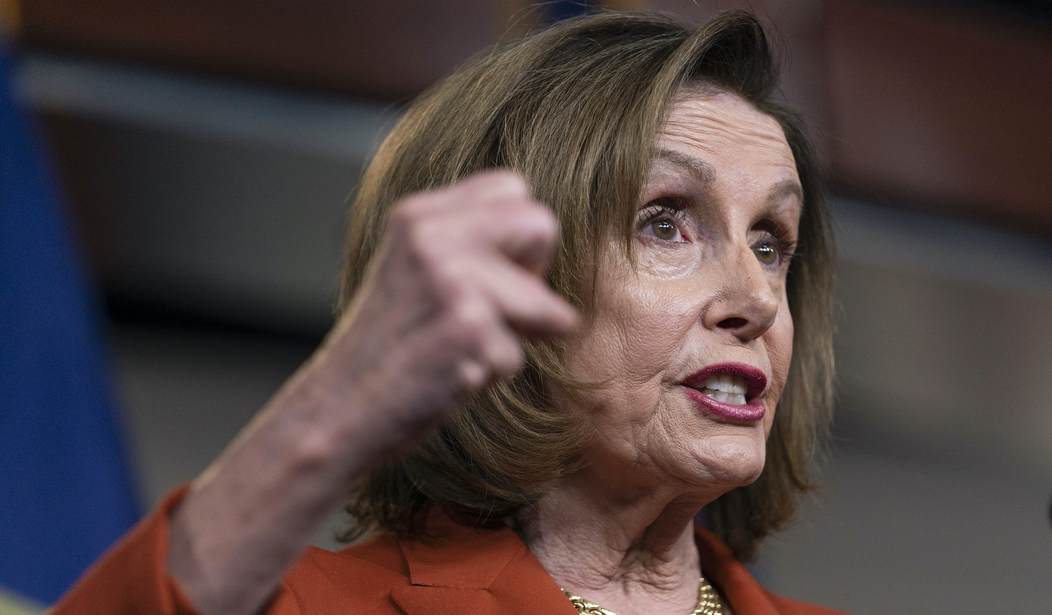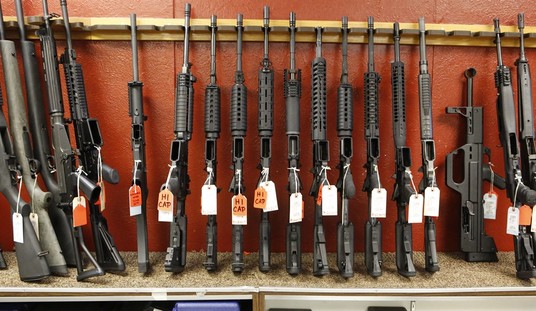And by “little,” I mean “no chance”… with one exception. Maybe the group of Republican and Democratic senators huddling together to find some sort of “compromise” on gun control legislation ends up including a ban on the sale of modern sporting rifles for adults under the age of 21 (Mitch McConnell, for instance, says he’s open to the idea, though he’s not encouraging Republicans to back it), but bans on commonly-owned “large capacity” magazines, storage mandates, and other provisions of the House Democrats’ anti-gun package aren’t even a part of the Senate negotiations, and based on this evening’s House vote, I’d say any attempt to raise the age limit on gun purchases is going to struggle to find support among ten GOP senators.
Still, that didn’t stop Nancy Pelosi from holding the performative vote on multiple gun control measures Wednesday evening, and she plans on following today’s vote with another tomorrow on a bill that would both incentivize states to adopt “red flag” firearm seizure laws and establish a federal “red flag” law as well. The incentives for state-level red flag laws are also a part of the Senate discussions, but the idea of a federal red flag law appears to have been shelved pretty early on in the talks.
Before Wednesday’s vote, House Democrats held an hours-long hearing featuring the testimony of some of the victims, survivors, and family members of the recent mass shootings in Buffalo, New York and Uvalde, Texas, many of whom demanded changes to federal gun laws and blamed Republican lawmakers, gun makers, and Second Amendment advocates for putting gun rights ahead of children’s lives; a claim that was roundly rejected by conservative lawmakers taking part in the committee hearing.
Republicans in the room offered sympathies to the victims but no indication that they intended to change their views on gun rights. Rep. Andrew S. Clyde (R-Ga.), a gun-store owner, said the tragedies “highlight the need for additional school security” and condemned Democrats for seeking to restrict firearms.
“While every loss of life is a tragedy, no one should weaponize or politicize these abhorrent acts to punish law-abiding citizens,” he said.
Rep. Richard Hudson (R-N.C.), a leading gun rights supporter among House Republicans, promoted legislation Wednesday that would put billions of federal dollars into school security programs but not touch gun laws. GOP leaders planned to force a vote on Hudson’s bill Wednesday as an alternative to the Democratic gun bill.
Hudson accused Democrats of “exploiting these tragedies to advance their radical gun-control agenda” and criticized House Speaker Nancy Pelosi (D-Calif.) and other leaders for inviting victims to testify and call for measures that cannot pass Congress.
“The bills on the floor this week would have done nothing to stop any of these tragedies, and they will never become law,” he said. “They’re exploiting the pain of these people, these children, these parents to advance their radical interests, and I say shame on them.”
After several hours of speeches on the floor of the House (it’s hard to call most of what I heard an actual “debate”), the votes on H.R. 7910 began, with each component receiving a separate vote. The first measure, raising the age to purchase semi-automatic rifles, was approved along a mostly party-line vote of 228-199. The second vote, on establishing a federal trafficking statute and expanding the federal laws prohibiting straw purchases, was approved by a similar 226-197 vote.
On and on it went, with roughly the same margins on all of the votes cast. Thirteen Republicans crossed over and voted in favor of a ban on bump stocks, which was the measure that received the most bipartisan support, but the vote on banning and “buying back” magazines that can hold more than 10-rounds of ammunition received just four votes from GOP members and saw an equal number of Democrats in opposition.
While the House package may have won approval, it’s going to be ignored by the other chamber, at least until we see if the Senate can reach any sort of agreement on its own. If not, Senate Majority Leader Chuck Schumer has already indicated he’ll proceed with votes on the full Democratic wish list of gun control legislation.
Well, most of the wish list, anyway. Even Nancy Pelosi doesn’t appear ready to hold a vote on Joe Biden’s proposed ban and “buyback” of the more than 20 million modern sporting rifles that are currently in the hands of legal gun owners. That wasn’t included in the omnibus gun control bill approved by the House Wednesday evening, and it’s not scheduled for as much as a committee hearing in the House at the moment. H.R. 7910, however, could very well be brought to the floor of the Senate, even though it’s an open question as to whether it would get the support of the entire Democratic caucus. Senator Joe Manchin has signaled that he’s once again open to a ban on AR-15s and other semi-automatic rifles, and has given his thumbs up to raising the age to purchase a modern sporting rifle to 21, but given that those are only two parts of the eight-part gun control legislation, if Manchin wants to find something to object to in order to withhold his vote he can.
On the issue of an under-21 gun ban, Rep. Greg Steube, a Florida Republican, pointed out during his floor speech that, according to the Department of Justice, just .3 percent of 18-20-year olds commit a violent crime in any given year, and .013 percent of adults under 21 are charged with a homicide. Those figures include crimes committed with and without a firearm, by the way. As Steube correctly wondered, why would anybody think that restricting the rights of 99.7% of young adults is going to stop the other .3% from committing a crime, or that it would be the most effective or constitutionally sound way to do so?
Like the rest of the gun control debate taking place on Capitol Hill, it’s not about what could be effective, but what might be politically possible. Sadly, after watching the House debate on Wednesday, I’m convinced that the actual effectiveness of any of these proposals is a secondary consideration at best for most of the proponents of these House measures. Instead, most of the speeches that I heard sounded like soundbites for upcoming campaign ads, which is also one of the main reasons why Democrats opted to hold separate votes on each new restriction on legal gun owners that they want to put in place.
House Democrats struggled to get ten of their Republican colleagues to go along with their adventures in anti-gun extremism, which makes these measures a non-starter in the Senate, but it’s still an open question about the number of Republicans who might be willing to agree to a package that’s far more limited in size and scope. In fact, I don’t think every GOP senator has made up their mind, and the contacts from constituents over the next few days could very well sway them to one side or the other. Wyoming Sen. Cynthia Loomis, for instance, mentioned on Tuesday that she’s been surprised by the number of calls from Wyoming residents who are “receptive… to address guns in some manner.” Loomis said that she’s still of the opinion that this is more a mental health issue than a gun control issue, but added that she’s “listening to what people from Wyoming are saying.”
If Loomis is listening, I guarantee other senators are too, and I’d encourage you to reach out and let your senators know where you stand, especially once the details of any “compromise” package have been released.









Join the conversation as a VIP Member